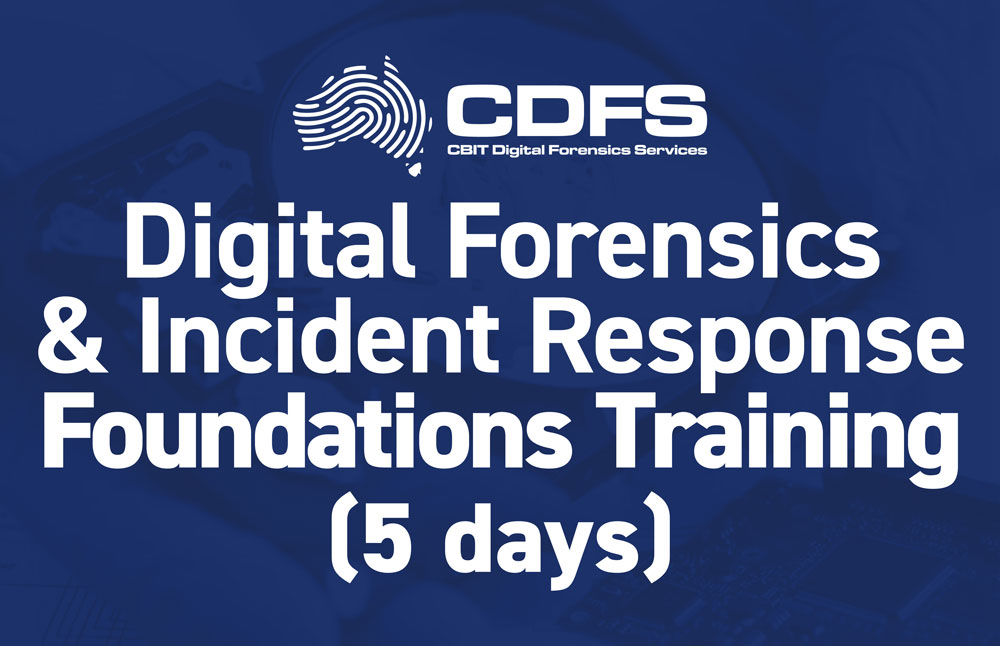
| Product Type |
|---|
Elcomsoft Forensic Disk Decryptor
Instantly access data stored in encrypted BitLocker, FileVault 2, PGP Disk, TrueCrypt and VeraCrypt disks and containers. The tool extracts cryptographic keys from RAM captures, hibernation and page files or uses plain-text password or escrow keys to decrypt files and folders stored in crypto containers or mount encrypted volumes as new drive letters for instant, real-time access.
- Decrypt BitLocker, BitLocker To Go, FileVault 2, PGP Disk, TrueCrypt and VeraCrypt volumes and containers
- Extract cryptographic keys from RAM captures, hibernation and page files, escrow and Recovery keys
- Fast, zero-footprint operation
- Instantly mount encrypted containers as drive letters
- Capture the content of computer’s volatile memory with kernel-level tool
- Extract encryption metadata from TrueCrypt, VeraCrypt, BitLocker, FileVault, PGP Disk, and LUKS encrypted disks, Jetico BestCrypt disks and containers
Supports: BitLocker (including TPM configurations), FileVault 2 (including APFS volumes), LUKS, PGP Disk, TrueCrypt and VeraCrypt encrypted containers and full disk encryption, BitLocker To Go, XTS-AES BitLocker encryption, Jetico BestCrypt, RAM dumps, hibernation files, page files
New features
Specifying Encryption and Hashing Algorithms for TrueCrypt/VeraCrypt
TrueCrypt and VeraCrypt allow users to change the encryption algorithm as well as the hash function used to generate the encryption key from the password. This information is never stored anywhere in the encrypted container. Should the expert specify the wrong algorithm, the attempt to recover the password will fail even if the correct password is tried. In this release, we’ve added the ability to specify algorithms for brute-forcing passwords when capturing encryption metadata from TrueCrypt/VeraCrypt volumes.
LUKS2 Encryption
We added support for LUKS2 encryption. The tool can extract LUKS2 metadata from encrypted disks and containers.
A Fully Integrated Solution for Accessing Encrypted Volumes
Elcomsoft Forensic Disk Decryptor offers a range of methods for gaining access to information stored in encrypted BitLocker, FileVault 2, LUKS, PGP Disk, TrueCrypt and VeraCrypt disks and volumes, and Jetico BestCrypt 9 containers. The toolkit allows using the volume’s plain-text password, escrow or recovery keys, as well as the binary keys extracted from the computer’s memory image or hibernation file. FileVault 2 recovery keys can be extracted from iCloud with Elcomsoft Phone Breaker, while BitLocker recovery keys are available in Active Directory or in the user’s Microsoft Account.
If neither the encryption key nor the recovery key can be extracted, EFDD can extract meta data from the encrypted container to let Elcomsoft Distributed Password Recovery do its job.
Extract Encryption Metadata
Extracting encryption metadata from the encrypted disk is required if you need access to the original plaintext password to access the data. Forensic Disk Decryptor will instantly extract the encryption metadata from encrypted hard drives, crypto-containers and forensic disk images protected with TrueCrypt, VeraCrypt, BitLocker, FileVault, PGP Disk, LUKS, and Jetico BestCrypt disks and containers. The resulting small file contains everything that’s required to launch a GPU-accelerated distributed attack with Elcomsoft Distributed Password Recovery.
Full Decryption, Instant Mount or Attack
With fully automatic detection of encrypted volumes and encryption settings, experts will only need to provide path to the encrypted container or disk image. Elcomsoft Forensic Disk Decryptor will automatically search for, identify and display encrypted volumes and details of their corresponding encryption settings.
Access is provided by either decrypting the entire content of an encrypted volume or by mounting the volume as a drive letter in unlocked, unencrypted mode. Both operations can be done with volumes as attached disks (physical or logical) or raw images; for FileVault 2, PGP Disk and BitLocker, decryption and mounting can be performed using recovery key (if available).
Full Decryption
Elcomsoft Forensic Disk Decryptor can automatically decrypt the entire content of the encrypted container, providing investigators with full, unrestricted access to all information stored on encrypted volumes
Real-Time Access to Encrypted Information
In the real-time mode, Elcomsoft Forensic Disk Decryptor mounts the encrypted volume as a new drive letter on the investigator’s PC. In this mode, forensic specialists enjoy fast, real-time access to protected information. Information read from mounted disks and volumes is decrypted on-the-fly in real time.
No Decryption Key and No Recovery Key?
If neither the decryption key nor the recovery key is available, Elcomsoft Forensic Disk Decryptor will extract metadata necessary to brute-force the password with Elcomsoft Distributed Password Recovery.
Elcomsoft Distributed Password Recovery can attack plain-text passwords protecting the encrypted containers with a range of advanced attacks including dictionary, mask and permutation attacks in addition to brute-force.
Sources of Encryption Keys
Elcomsoft Forensic Disk Decryptor needs the original encryption keys in order to access protected information stored in crypto containers. The encryption keys can be extracted from hibernation files or memory dump files acquired while the encrypted volume was mounted. There are three ways available to acquire the original encryption keys:
- By analyzing the hibernation file (if the PC being analyzed is turned off);
- By analyzing a memory dump file. A memory dump of a running PC can be acquired with the built-in memory imaging tool.
- By performing a FireWire attack (PC being analyzed must be running with encrypted volumes mounted). A free tool launched on investigator’s PC is required to perform the FireWire attack (e.g. Inception).
- By capturing a memory dump with built-in RAM imaging tool
FileVault 2, PGP Disk and BitLocker volumes can be decrypted or mounted by using the escrow key (Recovery Key).
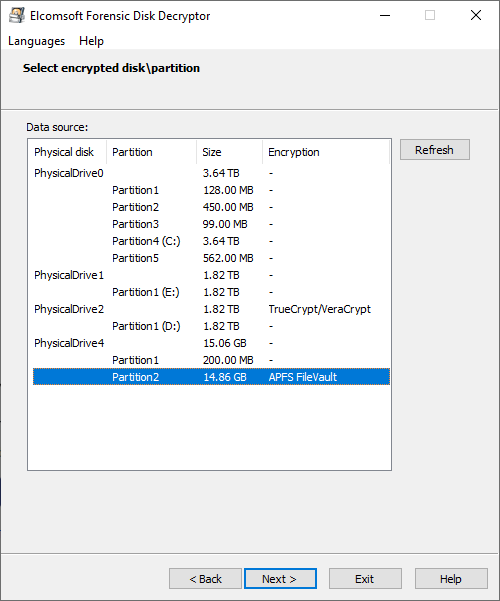
Select encrypted disk or partition (APFS, VeraCrypt, PGP, Bitlocker…)
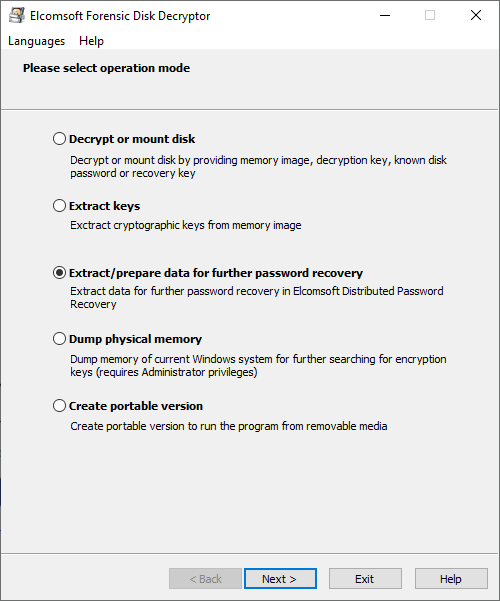
Extract data for further password recovery
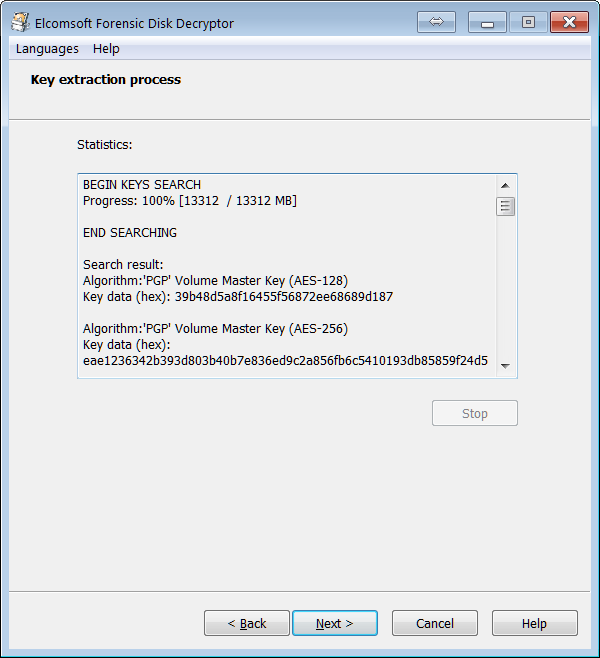
Elcomsoft Forensic Disk Decryptor key extraction process
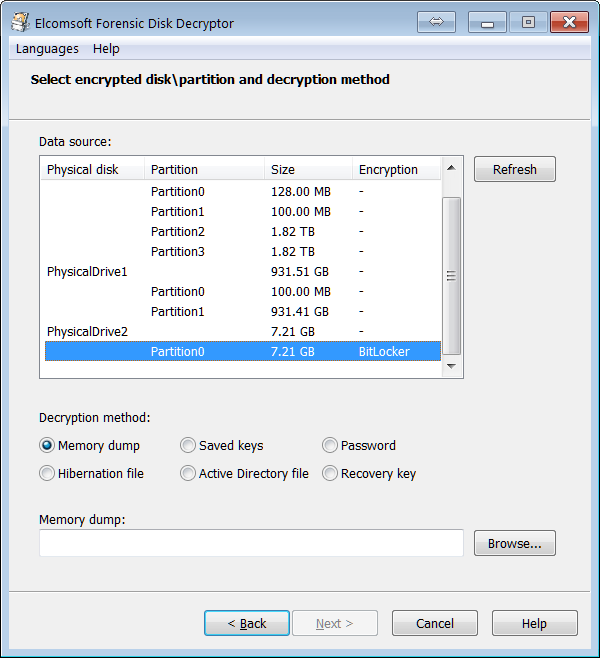
Elcomsoft Forensic Disk Decryptor selecting encrypted disk/partition and decryption method
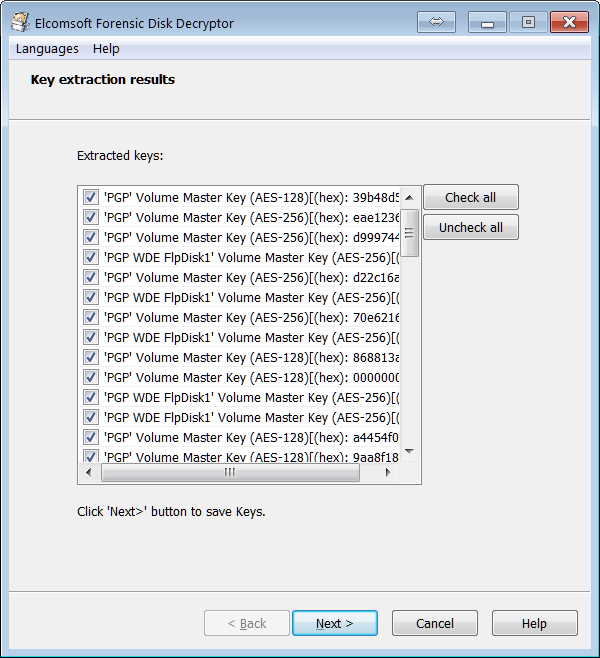
Elcomsoft Forensic Disk Decryptor key extraction results
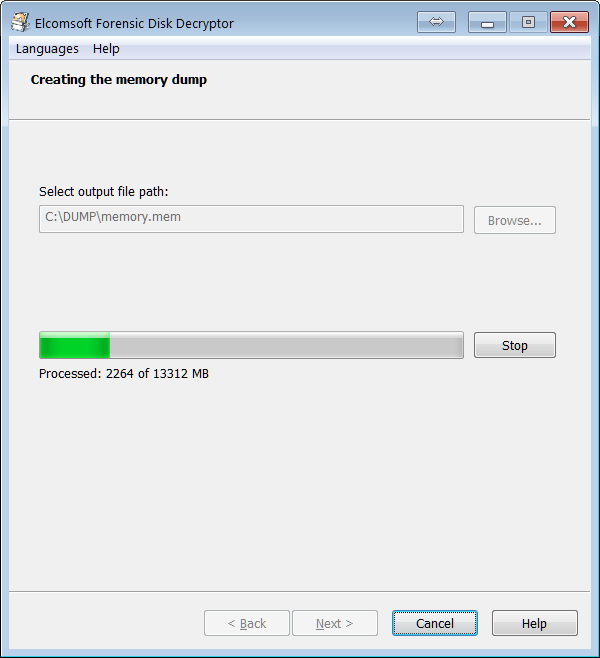
Elcomsoft Forensic Disk Decryptor creating memory dump
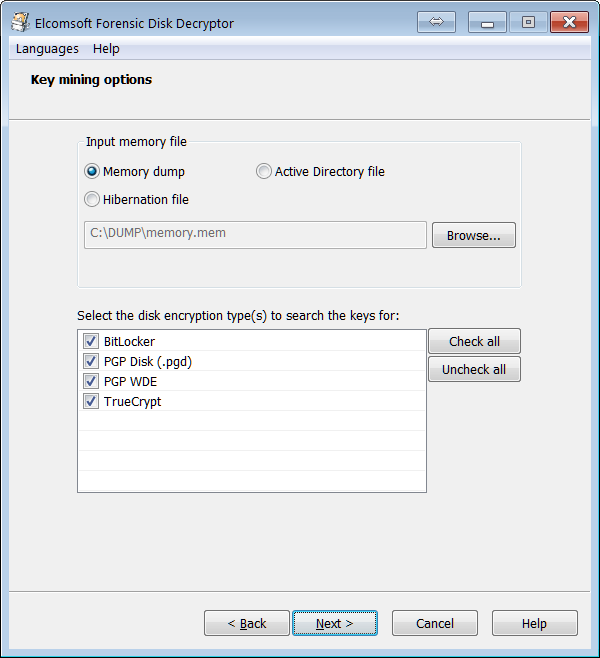
Elcomsoft Forensic Disk Decryptor key mining options
All Features and Benefits
Access Information Stored in Popular Crypto Containers
ElcomSoft offers investigators a fast, easy way to access encrypted information stored in a wide range of encrypted disks.
Acquiring Encryption Keys
There are at least three different methods for acquiring the decryption keys. The choice of one of the three methods depends on the running state of the PC being analyzed. It also depends on whether or not installation of a forensic tool is possible on a PC under investigation.
If the PC being investigated is turned off, the encryption keys may be retrieved from the hibernation file. The encrypted volume must be mounted before the computer went to sleep. If the volume is dismounted before hibernation, the encryption keys may not be derived from the hibernation file.
If the PC is turned on, a memory dump can be captured with a built-in memory imaging tool if installing such a tool is permitted (e.g. the PC is unlocked and the currently logged-in account has administrative privileges). The encrypted volume must be mounted at the time of acquisition.
Finally, if the PC being investigated is turned on but installing forensic tools is not possible (e.g. the PC is locked or logged-in account lacks administrative privileges), a DMA attack via a FireWire port can be performed in order to obtain a memory dump. This attack requires the use of a free third-party tool (such as Inception: http://www.breaknenter.org/projects/inception/), and offers near 100% results due to the implementation of the FireWire protocol that enables direct memory access. Both the target PC and the computer used for acquisition must have FireWire (IEEE 1394) ports.
Once the original encryption keys are acquired, Elcomsoft Forensic Disk Decryptor stores the keys for future access, and offers an option to either decrypt the entire content of encrypted container or mount the protected disk as another drive letter for real-time access.
Supported Disk Encryption Tools
Elcomsoft Forensic Disk Decryptor works with encrypted volumes created by current versions of BitLocker, FileVault 2, LUKS, PGP Disk, VeraCrypt and TrueCrypt, including removable and flash storage media encrypted with BitLocker To Go. Supports PGP Disk encrypted containers and full disk encryption, VeraCrypt and TrueCrypt system and hidden disks, and Jetico BestCrypt 9 containers.



